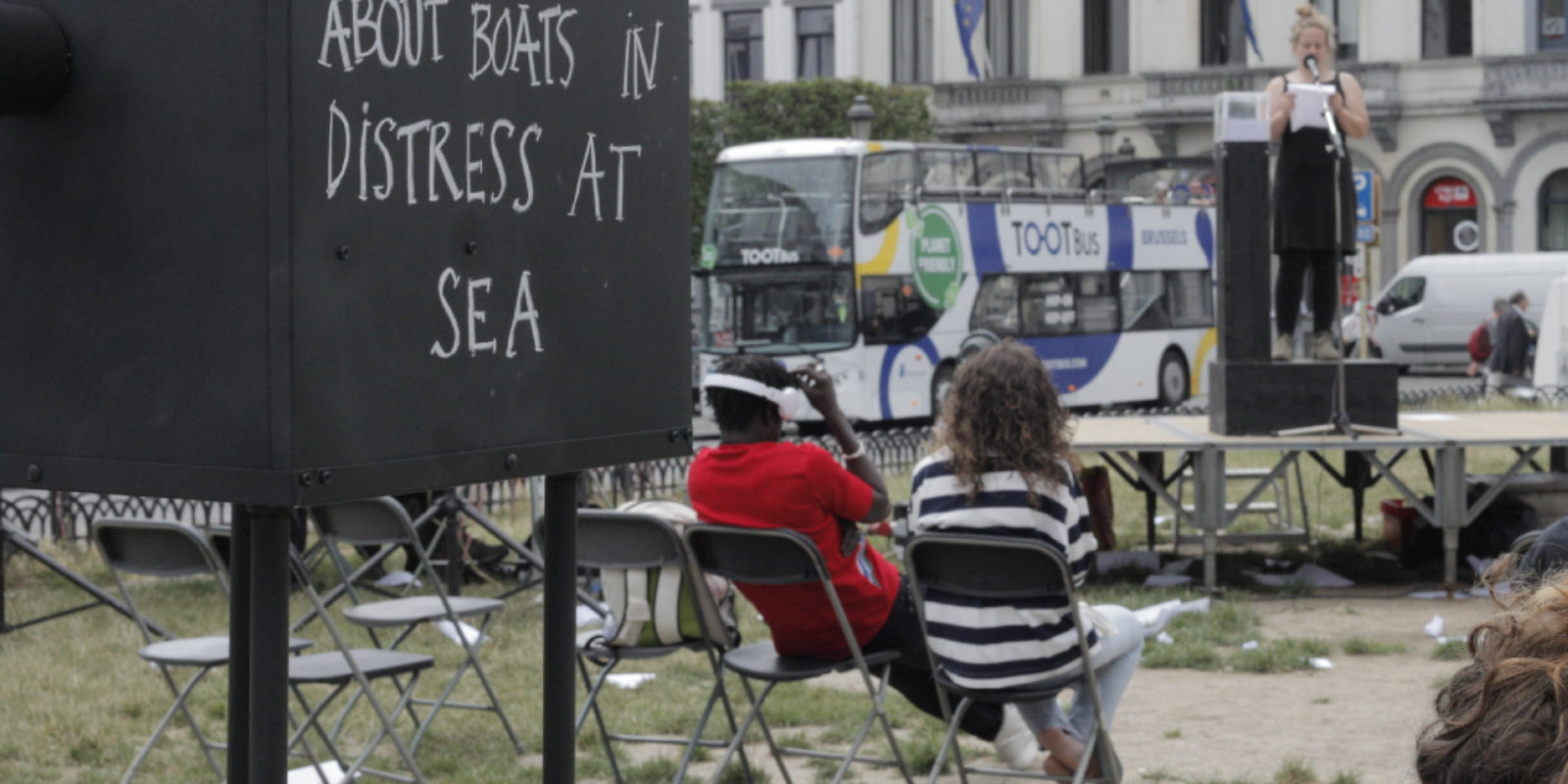For the first six months of 2023, the collective Alarm Phone had contact with as many as 539 boats in emergencies – roughly four per day. Alarm Phone tracks the territorial waters these boats are in, and then alert the Coast Guard to their responsibility to rescue people in distress.
CW: (Sexual) violence, death
Distress call during a celebration
On July 18, a day after Mark Rutte, Giorgia Meloni, Ursula von der Leyen and Kais Said clinked glasses in Tunis over their brand-new migration deal, Alarm Phone received the following report:
“We are not doing well. We were attacked by armed soldiers. Libyan troops shot at us, beat us up, and raped the women at night. I almost ran out of battery.”
The EU promised President Said as much as a billion euros as long as he ensured that people would no longer cross the Mediterranean illegally from Tunisia. The EU is happy to cooperate with a man who seized power only two years ago, and since then has accused black migrants of demografically replacing Tunisians in his speeches.
Meloni’s Migration Deal
After all, it does not look good for the EU if hundreds of people a year drown in the Mediterranean Sea because of European regulations. Hence the deal with Tunisia. Couldn’t Said be so nice as to let migrants die in the desert instead of at sea? At least then it won’t be Europe’s responsibility anymore. If this deals result in fewer migrants on the Mediterranean, it should serve as a blueprint for similar deals with Morocco and Algeria. A situation that would greatly benefit the European right. They can then portray North Africans as vicious racists a few years from now without getting their hands dirty themselves. Indeed, they will once again present their own asylum policy as the epitome of humanism and civilisation.
Perhaps most blatantly, the deal is phrased as a humanitarian landmark. Tunisia will guarantee the human rights of migrants, European leaders vow, despite all evidence to the contrary. The report above is just one of many that Alarm Phone received this summer: and news of the hundreds of black migrants chased into the desert in July after a pogrom in Sfax reached every major European newspaper. Rutte and Meloni know who they are entering in business with.
Proponents of the deal nevertheless claim it is necessary to combat illegal human smuggling. It would all be for the safety of that migrant being whisked away by smugglers for a life-threatening boat trip. That the EU contributes to life-threatening escape routes by carrying out illegal push-backs is an uncomfortable but necessary side effect, according to proponents. After all, the Union prefers not to have drowning deaths in its own waters. How considerate.
If the EU is so concerned about migrant safety, why doesn’t it build a bridge?
Alarm Phone
For years, Het Actiefonds has supported the collective Alarm Phone, a group of volunteers documenting the crossing of the Mediterranean Sea. Migrants call Alarm Phone to relay their situation and location, upon which the collective verifies the waters they are in and thus who is responsible for their safety. In this way, Alarm Phone puts pressure on the relevant authorities to rescue migrants in mortal danger. In the first six months of 2023, Alarm Phone was in contact with as many as 539 boats in distress – roughly four per day.
Alarm Phone has since become a regular part of reporting on disasters in the Mediterranean Sea (and North Sea). For example, the organization was in contact several times with the overcrowded fishing vessel that sank off the coast of Greece in July, leaving hundreds dead and missing. Despite attempts by Greek authorities to cover up the affair or blame it on human smugglers, it seems that it was the Coast Guard itself that caused the ship to capsize. Apparently, Greek authorities tried to use a tow rope to drag the boat into Italian waters.
In the Mediterranean, truth is often an afterthought. Hence the importance of organizations like Alarm Phone, which record the facts while the are still happening. Whether European countries do anything with those facts in time is another matter. 90 percent of the emails that Alarm Phone sends to coast guards, detailing the location and status of boats in danger, go unanswered.
Read-in at the European Parliament
As a protest against the EU’s frosty attitude, Alarm Phone therefore read out 1338 emails to the European Parliament in late June with reports of boats in danger. There was also an Alarm Box present at the protest: an alarm that went off live whenever a new emergency was reported to Alarm Phone.
Alarm Phone is one of the few organizations that understands what is going on at the borders of Fortress Europe and identifies its crimes. Therefore, we are proud to once again support this group.
Image: Watch the Med – Alarm Phone
Support Het Actiefonds with 10 euros a month and make actions happen worldwide
donate now
